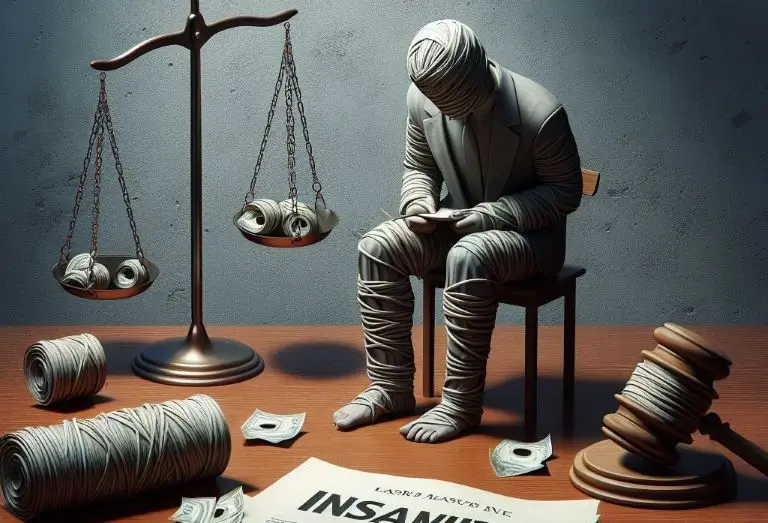In the symphony of Pakistan’s legal realm, an often-muted melody resounds—a melody woven from the stories of minds caught in the vortex of mental illness. With a canvas as intricate as the human psyche, the intersection of law and mental health beckons us to explore the alleys of compassion, justice, and the relentless pursuit of equilibrium. As we unlock this evocative narrative, we find ourselves treading the path of empathy, seeking to unshroud the enigma of mental illness law in the heartbeat of Pakistan’s legal consciousness.
A short while ago, the repercussions of a groundbreaking decision shook the legal landscape of Pakistan. In an instance that drew both scrutiny and debate, the Supreme Court of Pakistan issued a landmark verdict that sent ripples through the understanding of mental health. In a turn that startled many, the Court declared schizophrenia a condition that did not merit the classification of a “mental illness.”
The unfolding of this pivotal verdict echoes the resonance of the case of “Imdad Ali,” which came before the same Supreme Court in April 2016. This case highlighted the complexities of the intersection between mental health and legal determinations. It underscored the challenge of comprehending the intricacies of psychological conditions within the context of justice.
In this milieu, the legal world faced a nigma—how to reconcile mental health’s subjective contours with the law’s objective framework. As the echoes of this decision continue to ripple across legal corridors, they compel us to reflect on the evolving nature of justice, the challenges of understanding mental health nuances within legal paradigms, and the critical need for a balanced approach when deciphering the intricate tapestry of the human mind within the realm of the law.
The Court’s determination rested on a meticulous examination, drawing from a dictionary delineation of schizophrenia and a precedent set by the Supreme Court of India in 1976 during the Amrit Bhushan Case. This landmark ruling posited that schizophrenia does not universally entail a perpetual disorder and might not qualify as a legitimate defence in cases involving murder charges.
The legal discourse pivoted around questions of whether Article 10-A of the Constitution was being duly met for individuals with mental disabilities during investigations and trials.
The verdict rendered in Imdad Ali’s case ignited a poignant dialogue within legal and intellectual circles, both within Pakistan and reverberating far beyond its borders. This discourse assumed a deeply contemplative tone, weaving around the core inquiries that arose:
- Can the requirements stipulated by Article 10-A of the Constitution be considered duly met if individuals beset by mental disabilities find themselves bereft of safeguards throughout the investigation and trial phases?
- To what extent do Pakistan’s procedural protocols in criminal matters harmonise with the precepts enshrined within the 2011 Convention on the Rights of Persons with Disabilities (CRPD)? This international covenant mandates that endorsing nations allocate the necessary resources for individuals with disabilities to exercise their legal privileges effectively and be shielded from discriminatory practices.
- While acknowledging that utilising the insanity defence may elude those contending with schizophrenia, does this exception implicitly negate their intrinsic entitlement to medical intervention? The aftermath of this deliberation is tinged with a sombre reflection on the poignant interplay of justice, mental health, and human rights—a nexus wherein vulnerable individuals navigate intricate pathways within the legal framework. At the same time, society grapples with the bounden duty to uphold their well-being and rights.
This article meticulously explores the intricate correlation between the insanity defence and the imposition of the death penalty, contextualised explicitly within the Imdad Ali case. Central to this analysis are two widely acknowledged dimensions within the realm of insanity defence: its applicability during the criminal act and its relevance throughout the stages of interrogation, trial, and subsequent punishment. A central contention is presented, asserting the conspicuous absence of the latter facet of the insanity defence within Pakistan’s legal structure.
Moreover, the article ventures into the dichotomy of enduring versus transient insanity, a conceptual framework introduced through the Supreme Court’s verdict in the Imdad Ali case. This juxtaposition is subjected to a thorough evaluation, placed against the backdrop of established jurisprudence concerning the insanity defence. This evaluation is skillfully interwoven with pertinent global advancements in human rights.
The discourse then shifts to illuminate the inadequacies that permeate Pakistan’s existing legislation concerning insanity. These deficiencies encompass the deficiency of competency assessments, the absence of an all-encompassing definition of insanity, and the conspicuous lack of provisions to ensure proficient legal representation.
The absence of a comprehensive legal definition of insanity in Pakistan’s laws contributes to judicial confusion, highlighting the dire need for clarity.
As this analysis culminates, it’s imperative to underscore the possible repercussions of this legal landscape. The intricate interplay between these nuanced concepts puts those accused under such circumstances in a precarious position. This precariousness teeters on the edge of an often elusive and ambiguous precipice. The fragile boundary separating sanity from culpability becomes a battlefield of susceptibility—a trial marked by opacity and enigma. A prevailing sense of vulnerability takes root in this intricate legal realm, evoking a poignant sentiment of helplessness for those entrapped within its convoluted confines.
It is paramount to delve into the historical underpinnings that have shaped the very bedrock of insanity laws. In Pakistan, the assimilation of the McNaughton Rules into its penal code serves as the foundational cornerstone for the jurisprudential handling of insanity within criminal law. This is impeccably demonstrated through the articulation found within Section 84 of the Pakistan Criminal Code of 1898. This section establishes a comprehensive and exhaustive framework, dealing intricately with matters of insanity within the intricate tapestry of the criminal justice system.
Section 84 is a singularly comprehensive provision that governs the legal treatment of insanity. Operating under the purview of this section, the guiding principle is that an individual cannot be held accountable if their mental faculties have been compromised to an extent where the capacity to distinguish right from wrong becomes grievously impaired. What is particularly noteworthy is the deliberate semantic choice within the legislative domain. The term “unsoundness of mind” is employed within Section 84 instead of the more traditional “insanity.” This deliberate phrasing strategy is a calculated manoeuvre intended to broaden and meticulously delineate the scope of this legal concept. It encompasses a spectrum that spans persistent and transient incapacitation, a nuanced dimension vividly encapsulated in the legal precedent set forth by the case of Mehrban Alias Munna v. The State (2002). Crl. Appeal No. 65 of 2019.
From the outset, it is imperative to emphasize that most common law jurisdictions recognize the defense of insanity. This legal principle stipulates that if the accused cannot comprehend the ramifications of their actions when committing the offense, they cannot be subject to penalization or execution. This defense is enshrined in Section 84 of the Pakistan Penal Code. Implementing the International Covenant on Civil and Political Rights (ICCPR) of 1966 and the Convention on the Rights of Persons with Disabilities (CRPD) of 2011 introduced a further facet to this defense. This dimension necessitates the consideration of the mental well-being of the accused throughout their engagement with the criminal justice system, extending the relevance of insanity not solely to the moment of the crime but also encompassing stages such as interrogation, trial, and punishment.
Pakistan’s legal structure often marginalizes those with mental challenges, resulting in coerced confessions, perpetuated injustices, and an erosion of fundamental legal tenets.
Presently, it is judicious to affirm that global perspectives diverge on the latter dimension of this defense, specifically its applicability during the phases of interrogation, trial, and execution. Certain judicial instances have endorsed the contention that impairment of cognitive faculties constitutes a valid justification for postponing the execution of death sentences. Conversely, other jurisdictions have maintained that insanity does not warrant a deferment of execution. Legal systems aligned with the former viewpoint advocate that if the defendant is mentally incapacitated, a respite from capital punishment is justified to allow them to recuperate from their ailment. Within this perspective, extinguishing the life of an individual with a mental disorder is deemed to infringe upon the rights of individuals with disabilities. Additionally, it has been postulated that the execution of an individual who lacks comprehension of the rationale behind their punishment would fail to achieve the intended objectives of retribution or deterrence.
On the contrary, legal systems that do not endorse the defense of insanity during the stages of interrogation, trial, and execution assert that the plea of insanity should solely pertain to the moment of the offense and not extend after that. Within this paradigm, it is posited that if the accused could discern right from wrong precisely during the commission of the crime, there is no warrant for suspending the sentence.
In summary, the complexities of the insanity defense reflect divergent viewpoints across global legal landscapes. The evolving nature of legal interpretations underscores the intricate balance between considerations of mental health, justice, and the rights of persons with disabilities. The question of whether insanity should factor into the entirety of the criminal justice process continues to elicit robust debate within international legal discourse.
To grasp the contrasting viewpoints outlined above, it is essential to delve into the rationale behind deferring punishment for individuals with mental disabilities. Legal systems advocating for postponement assert that insanity renders a defendant susceptible to coerced confessions, undue compliance, and susceptibility during the interrogation phase, thereby undermining the fundamental tenets of a just trial. Moreover, it is contended that mental illness hampers effective communication between a suspect and their legal counsel, leaving the individual defenseless during trial and appellate proceedings. The incapacity stemming from mental illness obstructs the comprehension of the connection between criminal actions and subsequent penalties. In this context, executing an offender in a state of delirium fails to achieve the primary goals of punishment, namely deterrence and retribution.
In light of these considerations, it becomes evident that the insanity defense carries relevance not solely at the time of the crime’s commission but throughout the entirety of the suspect’s engagement with the criminal justice system. The initial ruling of the Supreme Court in the Imdad Ali case adopted a stance that regarded insanity as a defense exclusively applicable if the accused was mentally impaired during the crime’s occurrence and not beyond.
The suffering endured by those ensnared in the labyrinth of mental confusion cannot be ignored, calling for a profound paradigm shift in how Pakistan addresses insanity within its legal fabric.
Advancements in international law, which Pakistan has embraced through accession, coupled with the underlying principles supporting theories of punishment as deterrence, necessitate reevaluating this approach. It is imperative to ensure that the criteria for providing a fair trial to individuals grappling with disabilities are fully met.
As previously elucidated, the Supreme Court’s verdict in the Imdad Ali case stipulated that schizophrenia, a temporary mental disorder, should not be equated with a permanent impairment of mental faculties warranting clemency during execution. The court anchored its decision on a four-decade-old Indian legal precedent and a fifty-year-old dictionary definition of schizophrenia provided by the American Psychiatric Association (APA).
It is pivotal to highlight two pertinent points. Firstly, the Indian Supreme Court, whose verdict was invoked to support this stance, subsequently altered its perspective. The 2014 Shutrugan Chauhan case saw the Indian Supreme Court suspend the execution of a schizophrenic individual, reasoning that capital punishment primarily serves retribution and withholding execution until the prisoner comprehends the rationale is ethically imperative.
Secondly, given the rapid advancement in modern medical science, reliance on a fifty-year-old dictionary definition to ascertain the permanence or temporariness of an illness is precarious.
The approach endorsed by Pakistan’s Supreme Court may yield two significant repercussions. A suspect might inadvertently relinquish their right to appeal, especially if their legal representative is not vigilant and the suspect grapples with periods of delirium. Moreover, a suspect in such a state might struggle to effectively communicate with their lawyer during post-trial and post-conviction proceedings. It is evident that both of these scenarios bear implications for the right to a fair trial as enshrined in Article 10-A of Pakistan’s constitution.
In the Imdad Ali case, a government-appointed medical team concluded that he had schizophrenia twelve years after the murder. However, the lack of medical records before that assessment made it uncertain whether he had the condition during the commission of the crime.
Advancements in international law necessitate a reevaluation of Pakistan’s approach to insanity defense, ensuring coherence and fairness in judicial proceedings.
Given Pakistan’s legal framework, specifically Section 84 of the Pakistan Penal Code (PPC), protection is afforded only to those with mental disabilities at the time of the crime. Consequently, Imdad Ali received no consideration for his schizophrenia during trial and sentencing. While constrained by the existing insanity law, the pivotal issue was the request to postpone execution for treatment.
Section 464 of the Code of Criminal Procedure (CRPC) provided some guidance, allowing a magistrate to assess mental health and potentially postpone proceedings through a medical board. However, such efforts could be futile if the accused is returned to inadequate prison conditions, where temporary ailments might evolve into permanent ones. In Imdad Ali’s case, the Supreme Court deemed schizophrenia non-permanent, not under the Mental Health Ordinance’s definition of a ‘mental disorder,’ permitting treatment before execution. Although execution was later stayed, the rationale was not provided. This analysis focuses on the initial refusal of postponement, shedding light on the limitations within the legal framework governing the trial of mentally impaired suspects.
The legal landscape concerning the insanity defense has evolved significantly since 1968, when Mr. Karl Menninger of the American Psychiatric Association (APA) questioned the existence of schizophrenia. Contemporary jurisprudence has progressed to incorporate international legal standards from the International Covenant on Civil and Political Rights (ICCPR) of 1966 and the Convention on Rights of Persons with Disabilities (CRPD) of 2011. These conventions emphasize protection from cruel and degrading treatment, the elimination of discrimination, and the provision of necessary resources for individuals with disabilities to ensure the fair exercise of legal rights.
In 2006, the American Bar Association (ABA) endorsed a resolution stipulating that mentally ill defendants should be spared from execution if certain conditions are met:
- Unclear intent during the commission of the crime.
- Inability to effectively consult with their lawyer during various stages of legal proceedings.
- Mental condition at the time of execution.
- Capacity to waive appeals due to mental state.
These criteria underscore that temporarily insane suspects are just as vulnerable to presenting their defense as those with enduring mental disorders. Additionally, executing such individuals would be as futile as permanently deranged suspects if they failed to comprehend the link between their crime and punishment. Consequently, legal frameworks should be formulated to allow courts to place such suspects in mental health institutions for rehabilitation.
Limitations within the current legal framework concerning the insanity defense:
Within the current legal framework, limitations are evident concerning the insanity defense. Competency hearings, crucial to ascertaining an individual’s rational grasp of court proceedings and the ability to consult with a lawyer, lack specific procedures in Pakistan. For instance, a schizophrenic person in a state of severe delusion, detached from reality, cannot comprehend trial procedures, communicate with counsel, or safeguard their rights during interrogation.
US law, as exemplified by cases like Sell v. US, Ford v. Wainright, and Panetti, underscores the importance of mental competence. Incompetent defendants are directed to mental health institutions for rehabilitation and, in cases of temporary illness, confinement in such institutions until recovery is ensured. These principles align with the Convention on Rights of Persons with Disabilities (CRPD) of 2011 and the International Covenant on Civil and Political Rights (1966), emphasizing non-discrimination based on physical disability. / Sell v. U.S., 539 U.S. 166American Psychological Association.
Pakistan lacks dedicated procedures for competency hearings, relying on judges to evaluate a defendant’s trial capacity. Even when expert evidence is presented, judges may favor personal sources over reliability, as in Imdad Ali’s case. This highlights the dire need for competency hearings for mentally disabled individuals undergoing trials in Pakistan. Prosecuting someone who is unable to grasp the purpose of prosecution serves no retributive end. It devolves into a formal exercise devoid of substance, potentially disregarding justice balance and proportionality. This misalignment leads the justice system to perpetrate wrongs rather than rectifying past injustices, undermining its function and mirroring what it strives to counter.
The absence of a comprehensive legal definition of insanity in Pakistan’s laws contributes to judicial confusion. In 2006, the American Bar Association (ABA) formulated a framework involving three pertinent inquiries concerning the insanity defense in capital punishment trials.
Firstly, suppose the defendant is deemed insane when committing the crime or unaware that their actions constitute a criminal offense. In that case, capital punishment cannot be imposed. The burden of establishing insanity rests on the defense. The jury’s deliberation, guided by the presented evidence and the testimony of a psychiatric expert, seeks to ascertain whether the defendant comprehends the nature of their actions and the underlying rationale for punishment. If the jury concludes that this comprehension is lacking, the verdict of not guilty because of insanity should be rendered, leading to confinement in a mental health institution.
Secondly, if the defendant struggles to grasp trial proceedings or communicate effectively with their legal counsel to formulate a defense and is consequently unable to navigate the various stages of trial and appeals, execution is precluded. Instead, commitment to a mental health institution becomes a viable course of action.
Lastly, as established in the Ford v. Wainwright case, executing a prisoner incapable of comprehending the purpose behind their punishment or the grounds for its imposition violates constitutional principles. However, if the convict’s cognitive capacity is subsequently restored, execution may be considered.
The prevailing need within the legal landscape is to address the definitional gaps surrounding insanity to ensure coherence and fairness in judicial proceedings.
As highlighted by an observer, cases involving insanity crucially pivot on whether the defendant can access proficient and dedicated legal representation, given their compromised ability to defend themselves. This perspective underscores the significance of Article 12 of the CRPD 2011, which obligates state parties to ensure that individuals with disabilities are equipped with the essential means to exercise their legal rights. This encompasses the entitlement to a capable and committed counsel proficient in advocating for the accused and safeguarding their rights. Moreover, the accused must be allowed to present evidence regarding their mental state during the offense.
A pertinent instance of these principles comes to light in the case of Muneer Hussain, where Pakistan’s deficiency in providing adequate legal representation to the accused was evident. The impromptu appointment of counsel, who even neglected to review pertinent medical documents in court, culminated in the imposition of the death penalty and the eventual execution of the accused. This action unequivocally contravened the stipulations of the CRPD 2011 and unfolded on April 28, 2015.
The time has come to reshape the narrative, steering away from manipulation and toward a legal system marked by equity and compassion.
Given the elucidation above, the necessity for Pakistan to adopt legislative measures aligned with the ABA resolution of 2006 becomes apparent. Such legal reforms are imperative to safeguard the rights of individuals grappling with mental challenges, adhering to the mandates of Article 10-A of the Constitution, Chapter 1: Part II: Fundamental Rights and Principles of Policy and fulfilling international commitments under the CRPD 2011 and ICCPR 1966. However, it is paramount to navigate these endeavors within the existing confines of the legal framework concerning the insanity defense.
Pakistan’s criminal law acknowledges only one defense for individuals grappling with mental challenges: an accused might be acquitted of their offense if they were deemed insane or lacked comprehension of the consequences of their actions at the time of committing the crime. However, this safeguard offers no protection to those experiencing insanity upon arrest, interrogation, trial, and punishment stages. The insights of psychiatric experts reveal that mentally disabled suspects can be easily coerced and manipulated into confessing. Due to their susceptibility to suggestions and impulsive tendencies, they often become compliant and are unable to collaborate with their legal representatives effectively. This leaves them vulnerable to discrimination, oppression, and injustice during interrogation and trial proceedings.
Such circumstances flagrantly contravene the ICCPR of 1966 and the CRPD of 2011; both underscore the importance of equality before the law and ensuring total legal capacity for individuals with disabilities. Under the prevailing laws of Pakistan, there is a shortage of provisions for adequate representation through proficient legal counsel. Similarly, there is no provision for postponing sentences until recovery from mental illness, nor is there any framework for establishing mental health institutions for treating mentally challenged suspects. The law’s silence regarding protection against self-incrimination and coerced confessions exacerbates the predicament.
An individual suffering from mental illness, incapable of consulting with their lawyer, and oblivious to the ramifications of decisions made during trial proceedings, operates at an evident disadvantage compared to someone without such challenges. This glaring inequality contradicts the principles of a fair trial and non-discrimination enshrined in various national documents, including the constitution and international conventions to which Pakistan is a signatory. Ensuring adherence to appropriate trial standards under Article 10-A of the constitution becomes implausible under such circumstances.
Consequently, it is the solemn responsibility of the Pakistani government to extend to individuals grappling with mental disabilities the aid of competent and dedicated legal counsel. This counsel should help patients fathom the intricacies of trial proceedings, including protections against self-incrimination and the right to appeal. Crucially, mentally ill defendants should be granted a fair chance to present evidence of their mental state when they commit the crime. Similarly, conducting competency hearings to gauge the accused’s fitness to stand trial is imperative. In instances of proven disability, whether temporary or permanent, capital punishment should be suspended until the accused has undergone treatment and recovery within medical health institutions. The dire necessity for such reforms is apparent, as the current legal landscape perpetuates a grave injustice against those afflicted by mental disabilities.
Embedded within the core of Pakistan’s legal structure lies an issue that transcends mere technicalities and delves into the very essence of human compassion and equity. The complexities of the insanity plea paint a vivid picture of vulnerability, desolation, and an urgent call for transformation. The saga of Imdad Ali has cast a glaring spotlight on the deficiencies in our legal framework, unveiling a path strewn with misconceptions and opportunities that should be addressed.
The narrative of Imdad Ali extends far beyond an individual’s fate; it serves as a stark reminder of a broader predicament that affects the countless lives of those grappling with mental disabilities. The trajectory from apprehension to trial, from interrogation to judgment, should be illuminated by the principles of fairness and empathy. Instead, the prevailing legal structure often marginalizes those with mental challenges, treating them as mere inconveniences and disregarding their struggles. This results in coerced confessions, perpetuated injustices, and an erosion of the very tenets our legal system is built upon.
The limitations revealed through Imdad Ali’s case underscore an imperative for a profound paradigm shift in how Pakistan addresses insanity within its legal fabric. The unvarnished truth is that our present system, while well-intentioned, falls short of affording individuals with mental disabilities the essential rights and protections they merit. It is an impassioned plea for comprehension, compassion, and justice that resonates not only within courtrooms but also in the hearts of those who yearn for a more equitable society.
The suffering endured by those ensnared in the labyrinth of mental confusion cannot be ignored. To transcend the confines of legal precedents and bureaucratic norms, we must weave a safety net of empathy, ensuring that every individual’s rights are upheld, irrespective of their mental state. The case of Imdad Ali should catalyze a clarion call for reform. This awakening propels us toward a future where the defense of insanity is not merely a legal doctrine but an embodiment of our commitment to humanity.
As we reflect on Imdad Ali’s odyssey and navigate the intricate complexities of Pakistan’s insanity law, let us pledge to chart a course of change. Let us advocate for all-encompassing definitions of insanity spanning every criminal justice continuum phase. Let us fervently demand access to proficient legal representation for those with mental challenges, along with establishing institutions that nurture healing rather than exacerbate affliction. The time has come to reshape the narrative, steering away from manipulation and toward a system marked by equity and compassion.
Ultimately, a society’s accurate measure of humanity is revealed in its treatment of its most vulnerable members. Pakistan must seize the moment, bridging gaps and ensuring our legal system becomes a beacon of hope, comprehension, and justice for all. While the journey may be arduous and the hurdles formidable, the cause remains, and its impact is immeasurable. Let us march forward, guided by the memory of Imdad Ali’s ordeal, sculpting a future where the shadows of madness and manipulation no longer obscure the path to justice.










